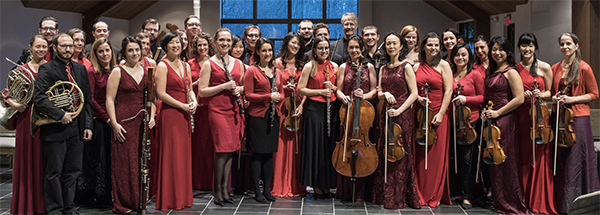by Peter Feher

At Lakewood Congregational Church on Sunday, October 20, Peled prefaced the piece with a wide-ranging explanation. He outlined the dialogue between soloist and orchestra, the former making impassioned pleas, the latter answering with everything from indifference to hellfire. He also referenced his Israeli heritage, his Jewish faith, the time of year (two weeks after Yom Kippur), and even the venue in explicating the music’s source material, a Jewish prayer for forgiveness. The effect was twofold, an intense introduction and a musical justification.
A piece like Kol Nidre — highly listenable, overtly emotional — benefits from a sincere approach that tells you as much about the musician as the music itself. Doing double-duty as conductor and soloist, Peled led a distinctive performance. He played with a sound that was fantastically un-cello-like, very reedy and tending to exaggeration (wide vibrato or none at all). The implications extended the expressive range of an instrument that already traverses registers and extremes. As a collective, the CityMusic string players responded sensitively to Peled’s idiosyncrasies. Redemption, for Bruch’s music and the entreating soloist alike, came in the form of a highly personal interpretation.
The other string piece on Sunday’s program, Jessie Montgomery’s Strum (2012), accessed an entirely different aspect of the ensemble. There’s a playful contradiction at work here, as in a lot of string-orchestra music: asking section players to be extroverted while remaining section players. The CityMusic musicians were more than up to the challenge, digging into the rousing and adventurous aspects of the score. As conductor, Peled maintained the energy of the piece but wisely stayed out of his players’ way.
Strum may not utter a new word on the subject of string-orchestra music — its fragmented treatment of melody is minimalist, and it compiles existing extended techniques but doesn’t propound new ones — but it’s an enjoyable work that charms with its high-octane stylings.
The ensemble’s energy fluctuated in the two Classical-era symphonies that bookended the program — Mozart’s No. 35 and Haydn’s No. 104. The opening movement of each seemed sluggish, thanks in part to the venue’s acoustic, which privileged brass and timpani. In comparison, the finales were edge-of-your-seat exciting, thanks to Peled’s quick tempos and the first violins’ virtuosic playing. Certainly, part of Mozart’s and Haydn’s appeal lies in the perennial challenges their music poses, a fact alluded to in the title of Sunday’s program, “Between Two Giants.”
Ending on a newsworthy note, Peled announced in a brief post-concert discussion with the audience that CityMusic is commissioning a new work from Jessie Montgomery, another thing to look forward to during his tenure here in Cleveland.
Published on ClevelandClassical.com October 28, 2019.
Click here for a printable copy of this article


